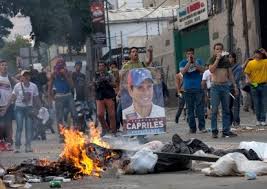
Bruno Lima Rocha, April 2013
Nicolás Maduro, Venezuela's elected president and political successor appointed by Hugo Chávez, began his government the hardest way possible. The National Electoral Council (CNE) proclaimed him as head of the executive after the count of the total vote in an election which saw the participation of 79.17% of the voters. Maduro, leading the PSUV, obtained 50.75% of the vote (7,563,747) and Henrique Capriles, governor of the state of Miranda representing the Democratic Unity Roundtable (MUD), received 48.97% (7,298,491). There was a high level of abstention with more than 20% of the electorate not voting. The novelty is the strengthened right, winning in seven states, instead of only three as in the December elections, when Chávez was still alive.
The tight difference of only 273,000 votes, is encouraging the opposition led by the oligarchy to call their constituents out onto the streets and challenge the legitimacy of the outcome. The demand for a recount is a way to cast doubt on the transparency of a screening process legitimized by international bodies. It operates as a ploy for the accumulation of forces on two levels. Inside the Venezuelan right, Capriles is building up muscle, legitimizing himself as an unambiguous leader, the only valid option for half of the electorate in the country. In the confrontation with the Miraflores Palace, he says he can be as hard as his coup allies of 2002 and 2003. If you can overthrow the electoral process, causing national uproar by means of a recount, so much the better. In the absence of this possibility, undermining the situation now operating under a new condition – that of Chavism without Chávez – makes victory in the recall referendum in three years' time a possibility.
In the external arena, the tight margin is animating the USA. The State Department, headed by the new secretary John Kerry, willing to show service and reap the sort of political and military victories as Hillary Clinton did, has already taken a first step by indicating that he would look favourably on a recount. Let no-one be alarmed by the gradual escalation of street violence and possible attempts at institutional break-ups of state and municipal governments. They are likely to generate a lot of confusion in the short term. The goal is to try to prevent Maduro from governing, by forcing him to crack down on the opposition by use of the institutional path, through the military and the judiciary. The procedure involves successive national upheavals and shortages, a fracturing of the PSUV and the high command of the Armed Forces in order to create the conditions for a coup. Difficult years ahead.
Translation by FdCA – International Relations Office – original posted in English in Anarkismo.net
